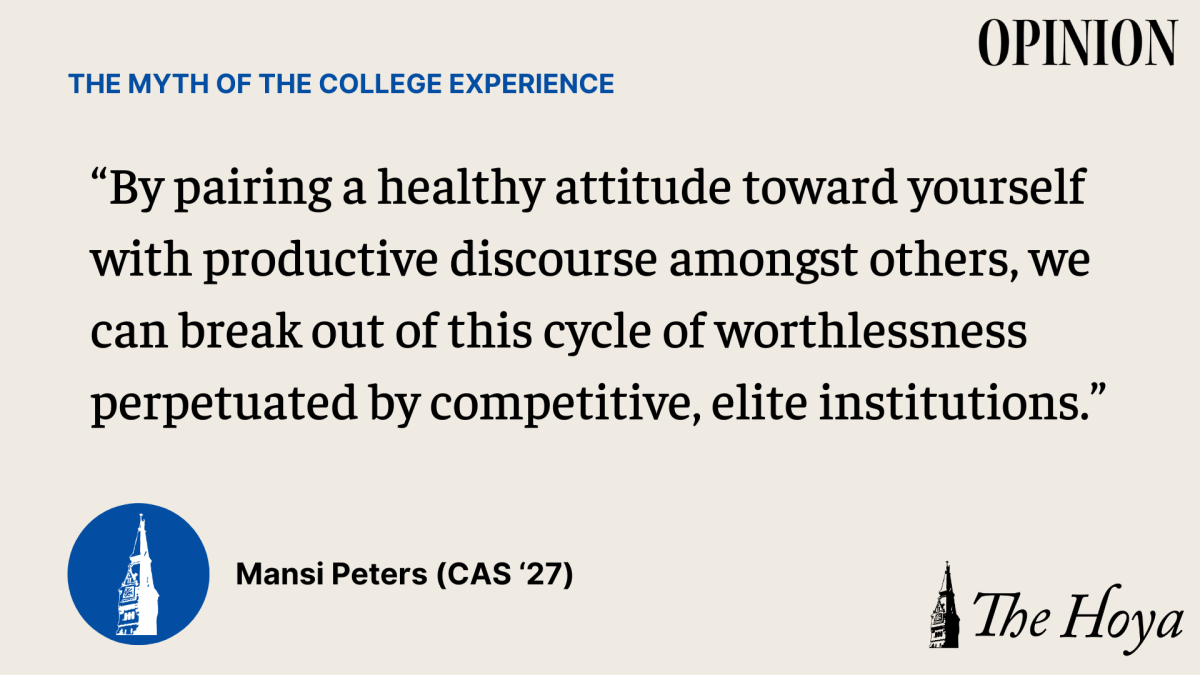
When I was feeling sorry for myself, I thought about how tiring doing that really is — always doubting myself, constantly comparing myself to the classmate who never seems to get a question wrong and picking at every mistake I make throughout my day. At a place like Georgetown University, where a shared drive for success can mean everyone is talking about their 10 clubs and upcoming internships, imposter syndrome can consume you, and it’s natural to feel isolated.
If you look up “imposter syndrome,” you’ll find a definition that’s lackluster at best, at least compared to how you feel. The internet will also offer a barrage of suggestions to treat this horrible feeling. “Developing self-compassion” is the bullet point that always caught my eye. Cultivating self-compassion is a challenge for students, especially those who tie their self-worth to their performance in school, work or extracurricular activities. I once believed that my imposter syndrome at Georgetown would fade after freshman year. I came to discover that this feeling is relentless. Despite putting in every ounce of energy to practice this “self-compassion,” it never really went away.
But here’s what I’ve come to realize and what I invite you to consider: When we emphasize self-compassion, we overlook something equally as powerful. By focusing solely on the self in self-compassion, we risk staying trapped in the same isolating mindset that fueled our imposter syndrome in the first place. Rather, if we take the respect that we must first give to ourselves and, in turn, apply those same behaviors to our conversations with others, we could stop perpetuating that toxic, success-contingent sense of self-worth.
Think about it. On my most stressful days, I catch myself replaying conversations with friends where we only talked about our club commitments and academics –– not in a good way, but as if the only interesting thing about ourselves was whether or not a selective group on campus deemed us worthy by their arbitrary standards. In these moments, we’re not just struggling individually; we’re actively reinforcing the very culture that breeds imposter syndrome. Such interactions with our peers undermine any active effort to treat ourselves with more self-compassion. Every time we define ourselves solely by our achievements, we send a message to those around us that they should do the same. Maybe the real solution isn’t just about how we feel about ourselves but how we speak to each other.
It may take practice, but, instead of bonding with your friends over your professional rejections or academic setbacks, try actively sharing something you’re proud of or a trait about yourself you admire. By pairing a healthy attitude toward yourself with productive discourse amongst others, we can break out of this cycle of worthlessness perpetuated by competitive, elite institutions. This shift doesn’t mean abandoning ambition. Trust me, I still want straight A’s. I still want that job, and I am happy I feel inspired enough to have dreams and do what it takes to achieve them. But, it may also be true that school can just be for the love of learning. Sometimes, clubs will reject you and jobs will choose someone else over you. And that is okay.
Your contributions to your community and to Georgetown’s campus will always find their way back to you. While the academic caliber of the university we attend should not be undermined, such a competitive environment can enable a zero-sum mentality about the world. In reality, our access to resources and an education of this quality places us in an opportunity-rich setting. If we recognize this more and blur the lines between competition and compassion, we may effectively build a culture where imposter syndrome loses its power. Cheer each other on, because we all have at least one thing in common: We belong here.
Mansi Peters is a sophomore in the College of Arts & Sciences. This is the second installment of her column “The Myth of the College Experience.”